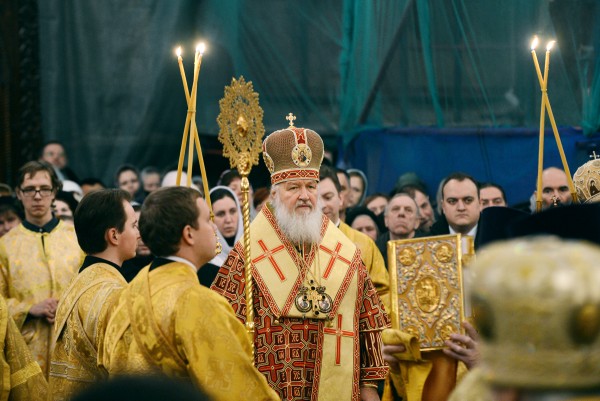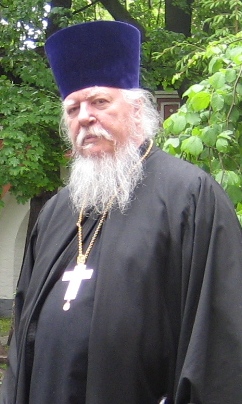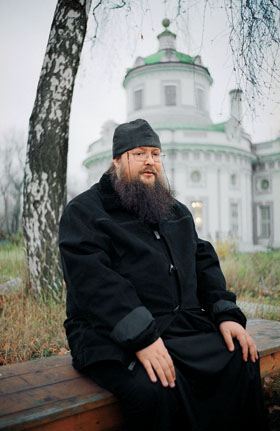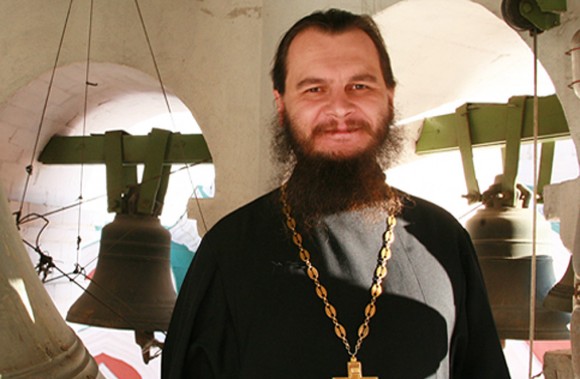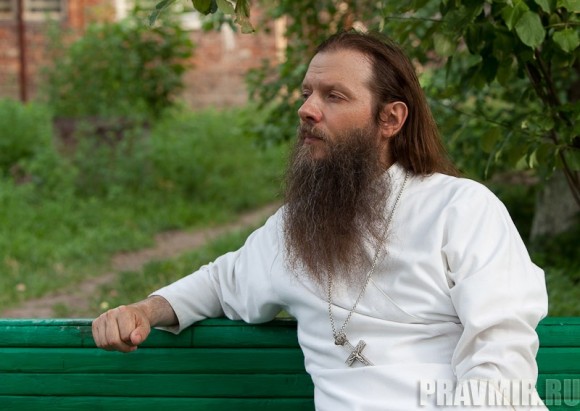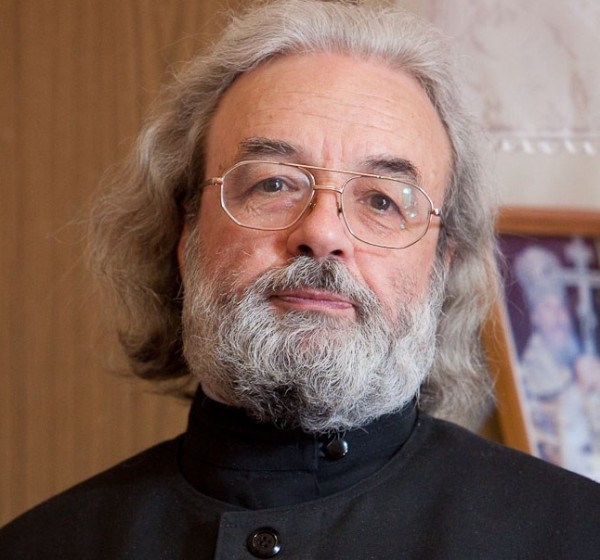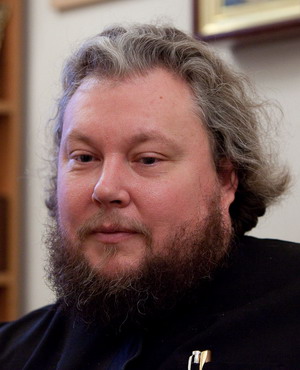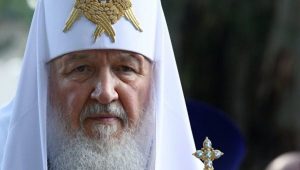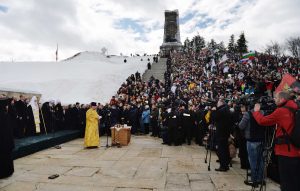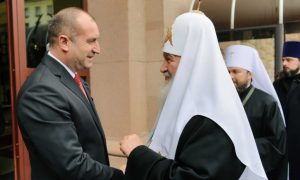Five years ago, on February 1 2009, His Holiness Patriarch Kirill was enthroned. The clergy discuss the significance of these five years for the life of the Church and Her faithful.
Against the spirit of this world
Archpriest Dmitri Smirnov, Patriarchal Representative to the Comission on Family and the Defense of Motherhood and Childhood:
His Holiness Patriarch Kirill has continued the work of His Holiness Patriarch Alexei, who prepared the soil for his successor. Thanks to Alexei’s efforts, the church has obtained a place of distinction in the opinion of the people. But even back then, of course, Metropolitan Kirill, who was not yet Patriarch, was serving the Church. All of the titanic labor that has been conducted in the Church has passed through his head, his hands, and his heart.
Over the last five years, the Patriarch has dealt with problems that have been brewing over the course of several centuries. Some serious changes are affecting us, and will continue to do so over the course of decades. The Patriarch is one of those rare persons who looks not ten years but one-hundred years into the future.
So much has been done over the past five years that it’s hard for me to enumerate. One has to leave something out.
It’s as if, in the Church, time has sped up in every way. In such a historical context it would be very difficult for us were it not for the spiritual strength of our leader, his personality, and his ability to struggle with God’s help, which are plainly apparent.
Necessary changes must be made in the Church: The number of eparchies has increased; Synodal decisions have begun to be implemented. Before, whenever the Synod worked out some sort of decisions, they would often remain unknown to the majority of the people of the Church. Now such decisions take place not only in history; they become part of actual practice.
The Patriarch is not afraid to take a step back if something is not quite timely. It’s not that he’ll forget an issue or cast it off; he only holds it over for some other time.
He’s been able to establish good relations with the government, as is greatly useful to the Church. I think that only under him could we have begun to realize a program for constructing two-hundred churches; but it has begun, and His Holiness has his hand on its pulse and pursues its accomplishment.
The introduction of the clergy into the State Defense Ministry is entirely his work.
I’m sure due entirely to his labors and prayers that our children are going to receive an education in the principles of Orthodox culture. In spite of all the opposition of the Soviet mentality, a distorted interpretation of the Constitution towards so-called “public” opinion, which simply became a conductor for elements, which are blowing for over the ocean, from Europe and so forth. It’s always hard to sail against this wind. But this is the true ecclesial task. The Church always sails against the spirit of this world. Against the spirit of the times. Now the spirit of the times is the spirit of Antichrist.
God has granted freedom to the Church. This is a unique period in our history. We don’t know how long it will last, but there hasn’t been anything like this before. And during this period of the restructuring of Church life under contemporary conditions, look what sort of a man God has given us! It makes one want to live, to labor, to pray. I’m happy that I live in this time, and than somewhere within in, on the outskirts, I am, in some small part, a fellow-laborer in that complex activity in which the Church is engaged, which is directed toward our baptized but insufficiently enlightened nation. It is hard to oppose the power that deceives the people through television, the stage, “glamour”, and now in our poor schools.
We all need to pray for our Leader, not simply formally, but with the real participation of the heart.
Mission, not Politics
Priest Constantine Kamyshanov, cleric of the Savior-Transfiguration Monastery in the city of Ryazan:
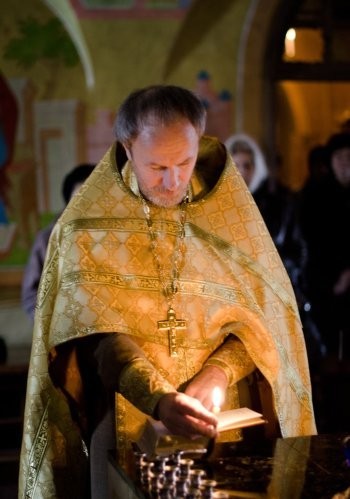
I’m not acquainted with the director of patriarchal protocol. I don’t go to those offices with their high walls, golden fretwork and heavy-framed portraits of hierarchs. Perhaps for that reason it’s easy for me to discern the general course of the ship of our Church. Big things are best seen from a distance.
According to my civil profession I’m an architect. So here’s what I’ve noticed about our situation. The revolution cut off the natural growth of our culture, and grafted in some sort of branches — not on the top, but on the side. Time went by. The grafted branches dried up, but the top of the tree has begun to sprout again.
In today’s Russian architecture, there is no contemporary art. Architecture is, as it were, still articulating the principles and terms that it could not express in the 30’s, 40’s and 50’s. The severed top [of the tree] is just starting to gather strength. Similar processes produced the work of the artists of the 60s, those geniuses of light regained.
The impression arises that not only our architecture, but our entire country has yet to fully articulate itself.
At the beginning of the last century, there was within the Church a precise and clear formulation of the idea of Symphony. The philosopher V. Solovyev expressed it best of all. The meaning of Symphony is that all the institutions of society are bricks in the construction of a new world that is being constructed according to God’s plan. It is assumed that we Christians should be transfiguring the world. This is the so-called process of “deification.” Thus, from Byzantium to Solovyev, the conviction took shape that all of us, like instruments in an orchestra, should play some certain musical sound under the direction of God. In this symphony, a part is appointed for Russia.
But here is a quotation from the Patriarch himself:
“The best minds of the Church and the best minds of the government worked toward the formulation of a model of the relationship between church and state. At that time they used the remarkable word “symphony” to describe this relationship. In Russian we use this word in a different sense. Thus “symphony” connotes a harmonious unification of interests, a division of responsibilities. The outline of this symphony is inscribed in the canonical tradition of the Orthodox Church. Of course, these relationships were never perfectly realized because of various circumstances, but they were always held up as the ideal.”
It would seem that this Symphony had been the secret creed of all of our autocrats. But if one should take up the manifestos and oaths of our tsars, he might be surprised to find that there is not a word there about Symphony. They are rather about honor, glory, prosperity, and loyalty to the throne. Everything there is prosaic and oriented toward the earthly, not to the heavenly.
This is to say that Symphony has never been a theme of our government. It is Russia’s word that has not yet been spoken. It is something new which the Patriarch has suggested to the country. Symphony is the most valuable project of the Christian world, which has been crystallized over the course of centuries. It is the continuation of the millenia-long experiment of devoting earthly life to heaven. In its practical application, it is friendship between God, the Church, and the government. But today many people doubt the benefit of such a union, and all elements thereof are submitted to criticism.
Today it is fashionable to curse the ecclesial vertical of authority. The model of the diaspora is suggested as an alternative: the election of clergy, the equality of the laity, and so forth. This is logical. Diasporas hold a place of preeminence in Russia today before the disorganized citizens. Diasporas have withstood the test of the ages. Is it possible then, having reduced the possibility of citizen’s rights, not to serve, for example, in the army, or not to have any contact with this government at all? Why not?
But Europe wasn’t built that way. It was bolder and less inhibited. Our beautiful continent was created always, to one degree or another, in conformity with Symphony. The beginning of its destruction was connected with different models, which were born in recent times. And it seems to me that the Symphony has not been exhausted.
Symphony is a new manifestation. It was always implicit in developing Europe, but nowhere has it ever been adopted as a national doctrine.
But, most importantly, this is not politics. This is that national idea which they strive so hard to avoid. Its chief distinction from politics is that it places the human being where politics places the parliament. This is a diametrically opposite approach. If people become internally free, then no sort of dictator shall ever be able to impose his defiled power.
The instrument of Symphony is not elections, but missions.
It is clear to me that both our Patriarch and the last two presidents have decided to try to realize this new scenario for the development of the country. And it seems to me that, regarding Symphony our new head of the Church persistently proposes the Christian mission to all of us, from the president to the provincial volunteer; and his call is finding a response.
This may be the last chance for Europe to remain Europe.
The result of the past five years, as I see it, has been the call to establish Symphony as the new format for the life of the country.
Almost nothing has happened. Almost. But something has started to give. This is only five years out of a thousand. It’s all just beginning.
The goal of this Russian rebirth is the Russian Quattrocento. Up until today, the human being in our country has been the faceless tool of history. The turn toward personality is nothing new in the history of our Fatherland. We have lived as the problems of princes, tsars, general secretaries, and now we have the opportunity to begin to live as the interests of the King of kings — of Christ.
The asset of the new Russia is the open and personal mission of the human being, associated with Christ.
Thus: Symphony, peace and personhood are the basis of a new worldview. Mission is the instrument of all of its intentions.
Without a doubt, the Patriarch has become an agent of this grand historical project of the continuation of European history in our country. The chief result of these five years has been that Patriarchs idea has begun to become worthy both of the nation and of the political leadership. Those at the top have begun to vaguely sense the necessity of taking a different course of development from that of the Western-European leftists.
One can find many problems both in church-state relations and within the Church. But we mustn’t miss the forest for the trees.
Therefore we must honor our Patriarch, who has taken it upon himself to revive the tree of our government, to put a new spirit into the nation, and to continue the path of the historical development of Christian nations.
Today it is our turn to add our word to the Symphony. And if we all strive so preserve the peace, the traditions, and the historical experience of our civilization, then everything will necessarily turn out right for us; for the Symphony is a building founded upon truth.
Properly Understanding Events
Protopriest Kirill Kaleda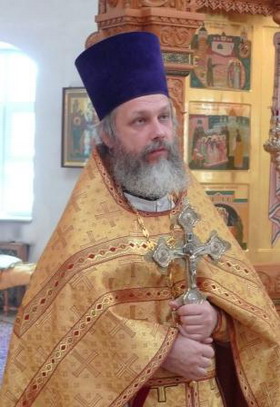 , rector of the Temple of the New Martyrs and Confessors of Russia in Butova:
, rector of the Temple of the New Martyrs and Confessors of Russia in Butova:
I’d like to share my memories of the first impressions which then-Metropolitan Kirill made upon my departed father, Protopriest Gleb Kaleda. Papa met the future Patriarch Kirill at the beginning of the 90s. When he came home he said that he’d never met a hierarch of the Russian Orthodox Church who was so politically minded, by which he meant that he had a literate and voluminous understanding of everything that was going on.
Indeed, His Holiness Patriarch Kirill is distinguished among all the other (usually very talented) ministers of our Church by the gifts which the Lord has given him, namely his voluminous mind and his feeling for the fullness of the Church.
One is amazed by his surprising aptitude for his work, by his energy. For example, when he was doing the divine services at the Butovsky Polygon — which aren’t simple services — he would rarely stay at the meal afterwards. In a few hours he’d find himself on some other mission in another region.
We probably still don’t perfectly understand the reforms that have happened over the past five years, like the appearance of many new eparchies, new hierarchs, the establishment of new metropolia. We need time for this.
I’d like to remark on one more attribute of the Hierarch’s ministry which I consider very important: He doesn’t forget about the far regions of Russia. He gives them a lot of attention, especially the distant regions of Siberia, the Far East, where there is a danger of losing contact with the spiritual center, with Moscow, with Central Russia. Therefore the Patriarch has on more than one occasion visited the distant eparchies himself, and pursues the development of spiritual and ecclesial life there.
Let us wish our leader many years of life and the help of God in his difficult ministry as first hierarch.
Protecting Orthodoxy
Igumen Sergei Rybko, Rector of the Church of the Descent of the Holy Spirit at the Lazarevsky Cemetery in Moscow:
I got to serve with Patriarch Kirill when he’d first become patriarch, and I was amazed by the warmth and attention he showed me. He inquired about my needs, asked how the construction was going, blessed me. I thought, “What business does the patriarch have with a common priest?!”
My most important impression of the Patriarch is as follows. The Patriarch, in spite of the attacks he’s received from the left and from the right, in spite of the fact that these attacks have been massive and technological, has never, not in anything at all, departed from the purity of the Orthodox confession of faith. As long as he continues defending Orthodoxy teachings without any compromise, I’m with him. Defending the Orthodox faith is the most important thing, and His Holiness the Patriarch is doing this worthily.
Without a Hitch
Protopriest Igor Fomin, Rector of the projected Church of the Right-believing Prince Alexander Nevsky at MGIMO:
As a simple priest, I can really examine all the events of the past five years in the Russian Orthodox Church. To my shame, I can’t even gather together in my mind all the things that His Holiness the Patriarch has accomplished.
Here is the kind of situation I have as a priest of the Moscow diocese, and especially as rector: There is a program underway to build two-hundred churches in Moscow. As the rector of one of these churches, I was aware of the need to build churches, but I couldn’t imagine how demanding it would be. Our large temporary church, designed for 300-350 people, filled up in less than a year, and we’re trying with all our strength to build a permanent church with a greater capacity.
I should also note the program for the teaching in schools of Principles of Orthodox Culture, which is developing successfully and which was also initiated by the Patriarch. It has resulted in a broader program: Principles of Religious Culture and Secular Ethics.
Having participated in Principles of Orthodox Culture, I can see how necessary it is, not only for children, but also for their parents. When I go to the school at the parents’ invitation to teach in the fourth grade, then they ask me to meet with the students of the ninth, tenth, and eleventh grades as well. This program is necessary so that we can grow the leaders of a new society — not consumers, but builders of a new life, patriots of their Fatherland; a new society of divinely-inspired people, oriented not toward earthly goods, but toward the inner, spiritual world.
His Holiness the Patriarch surely, calmly, without the upheavals that unchurched people expect, without revolutionary processes, orders the Church just like a single organism, functioning rightly both in the sphere of church government and that of spiritual nourishment.
They’ve stopped dividing the clergy into “young elders” and experienced clergymen. Now your age is not important, but rather your activity in the parish, your education. And that’s how it should be, since it’s precisely from lack of education that superstitions and pretensions arise in the Church, together with the desire to arrange things according to one’s own view, one’s own key.
I remember how somewhere the Patriarch overcame lack of understanding, and negative attitudes, by introducing the duties of missionary, catechist, and social worker, as full-time positions in each parish. Now this has become so natural and necessary that few remember how complicated things were at first. The partriach has also insisted on attracting laymen to professional work in all these areas. This is also working well now.
The Church is changing a lot, is being transformed, and we should take note of those innovations which often were misunderstood by many people, even churchly people. The Patriarch did a great thing: he organized inter-conciliar meetings. This provided a possibility for discussion in the Church which wasn’t there before. These discussions started to take up a lot of questions that are hard to understand. I could use the discussion about preparation for Communion as an example. This was discussed all over the Church. The Church-wide discussion reduced tension within the Church, and permitted the adoption of an educated, informed decision.
The Patriarch’s attitude towards social ministry is significant to me. The perspicacious attention that he gives to issues of the family and of adoption has born fruit. Besides this, we don’t only hear exhortations to mercy and social ministry, but we see (although unfortunately not everyone sees) the personal help that the Patriarch gives to real people, to families with a lot of children and to orphans.
I’m very happy that the Church hasn’t been dragged into the political sphere, as some people were trying to do. This is also an achievement of the Patriarch.
All that I’ve tried to make known here is not even one percent of the Patriarch’s activity. But I wanted to call attention to the fact that right now conditions are very favorable for Church activity, that there is a most favorable atmosphere for real workers in the fields of missionary work, social work, theological work, and youth work. We must make use of it. If we let this opportunity go, the sin will be ours. It’s always possible to find reasons to criticize and to do nothing. But that’s not our path. Let’s look for strength and ability so that this acceptable time for labor won’t be turned to our condemnation.
The Work Has Begun to Boil
Protopriest Artemy Vladimirov, Rector of the church of All-Saints in Krasnoe Selo:
Time flies quickly…
I remember, as many do, the service in Christ the Savior Cathedral, when His Holiness Kirill ascended the high place as the newly-chosen Patriarch…
What have these five years brought us?
The charismatic nature of the Patriarch, boiling with creative energy, armed with clear and dynamic words, has set the ecclesial fly-wheel spinning.
The contours of the maps of our diocese have changed.
New and fresh strength was brought into the episcopacy.
In spite of the difficult times and perennial lack of laborers, the transformation has directed itself. The work has begun to boil.
The parishes are enlivened with the ministries of mercy, enlightenment and the preaching of the Gospel. How obvious are the successes of these last two, even with small means.
The structuring of the Church continues, going to the root with the nurturing might of Russia, neither degenerating into superstition nor giving way before the face of the universal aggression of immorality.
It’s a pleasure to observe the fruitful concord of the authorities and the Church, in the face of the natural displeasure of those who neither create themselves nor give to others.
Let us note the wisdom of His Holiness, who guides the Church, part of which is located beyond the borders of Russia.
I consider his visit to Ukraine to be fateful, and I very much hope that, when the political crisis in Kiev has passed, it will be granted to His Holiness to preserve the unity of our Orthodox people, who will find a worthy successor of the most blessed Vladimir.
Remarkable is the disillusionment during the Patriarch’s course of our church liberals and modernists, who have long had their teeth set on edge by their own renovationist spasms.
The ecclesiality of Patriarch Kirill’s attitude is obvious. He unites preservation of the sources of eternal Russian Orthodoxy with a kind-hearted openness toward meeting a world made sick by sin …
All that is left is to pray for the strengthening of the powers of the First Hierarch and to be thankful that in these turbulent times we have what we have, through the mercy of God.
Already History
Protopriest Alexander Ilyashenko, Rector of the Church of the All-Merciful Savior:
Five years — from the historical point of view, it’s an entirely insignificant period. But in five years of Patriarch Kirill’s ministry, an unusual amount has happened that will doubtless go down not only in the history of the Russian Orthodox Church, but of Orthodoxy as a whole.
Five years ago, at the Patriarch’s enthronement, they declared to him that there was not and could not be anything in the life of a Patriarch that was personal, for all of his life was, without remainder, dedicated to God and the Church.
His Holiness certainly possesses rich spiritual experience, an encyclopedic understanding, and generally acknowledged authority, as much abroad as within our homeland. Patriarch’s Kirill contribution in the matters of the structuring of Church life and of all of society is difficult to assess.
The Patriarch is distinguished by a boiling energy and great creative potential, which spills over into projects of great scale. For example, the project of the construction of two-hundred churches in Moscow, the establishment of new eparchies, the establishment of the High Church Council. Under the indubitable leadership of His Holiness, effective organs are created and circles are expanded, helping the Patriarch to make decisions and to implement them in life. One must remark upon the Patriarch’s ability to find helpers and similarly minded people to help him successfully guide the ship of the Church through the tumultuous and contradictory life of the present.
Mastery of speech is rare ability. It’s better to call a gift, which gives His Holiness the ability to bring eternal moral values to the hearts of many of our countrymen.
The Patriarch’s fruitful activity, directed toward the rebirth of the Russian Church, the increase of the authority of the Church, unfortunately evokes the bitter opposition of those who conceive of freedom not as freedom from sin, but as utter autonomy, who see in the increase of Church authority the decrease of their own ostensible authority. This opposition is perhaps a confirmation, albeit a negative and circuitous one, of the success of the far-reaching activity of His Holiness Patriarch Kirill.
I wish to prayerfully wish His Holiness a long career, good health, patience, wisdom and other grace-given strengths for the bearing of the heavy cross of the Leader and First Hierarch of the Russian Orthodox Church.
Seeing How Russia Lives Today
Archpriest Alexander Ageikin, Rector of the Theophany Cathedral in Elokhov, Moscow:
A new era in the life of our Church began with the arrival of Patriarch Kirill.
Every Patriarch is established by the Lord for concrete ministry in a specific historical moment. His Holiness Patriarch Alexey, at whose side I also remained for many years, gave all of himself to the task of restoring much of what had been lost: the returning of churches, the rebirth of monasteries. One the one hand he was a bold man; on the other he walked a sharp path, in as much as it still remained to surmount the effects of the past.
His Holiness Patriarch Kirill is a man of activity. I got to participate in the work of the Local Synod. The news that Metropolitan Kirill had been chosen patriarch by a practical majority of votes signified immediately that a time of active work was beginning in the Church, a time of systematic work, when it would not be possible to sit out and act only when one felt like it. Ministry would become zealous, systematic. And that’s how it’s happened over the last five years.
The time of preparation for the enthronement itself … I remember how accordingly we first had to bring everything necessary into the Church of Christ the Savior.
Certainly, this was some kind of ultimate point in the rebirth of the fullness of Russian Church life. And the very approach to the preparations for the enthronement was tense, charged. Twenty years had passed since the last enthronement. We had to reestablish in everyone’s memory, everyone who knew anything about it, how an enthronement went: how did this go, how to make especially solemn, that the walls, particularly, of Christ the Savior Cathedral would be properly equipped, now that there was a possibility of both radio and television transmission.
It was the first moment of enthronement in the Russian Orthodox Church that could be seen by anyone who wanted to see it It was also the first enthronement in the XXI century. All of this made a special imprint on the event.
Then all of us were waiting to see what would happen at the end of the service: would we remain next to the Patriarch, or would we receive some other obedience? We were prepared for this. His Holiness Patriarch Kirill left us all standing around him. Each one understood his own needfulness, his own usefulness.
For me personally, these five years have been a special time, wherein I’ve seen the country, accompanying His Holiness on all of his journeys, from the Northern Sea to the Black, from Baltic to the Pacific Ocean. I’ve seen how people live. I’ve seen that the Patriarch is interested not only in what happens in the Church, but also in what happens in the lives of people, be they soldiers or sailors, people who mine petroleum or gas, or who someone who herds deer. Everything was interesting to him. He takes interest in every person, actively, sincerely and not pretentiously.
It’s very valuable to me that I’ve seen the life of the people not only in Moscow, but also in the most remote places, the furthest points: in Chukotka, in Kamchatka, in Sakhalina, the monastic life in Solovki.
On the one hand, it might seem like the Patriarch is such an urban person, an administrator. But he is a very deep monk and something of an ascetic. This isn’t noticeable from outside, but it’s very obvious to those who are close to him. His engagement with monastic life is genuine.
For me the past five years have opened up a new world, a new side of the life of Russia in general and of the Russian Orthodox Church.
Translated from the Russian












